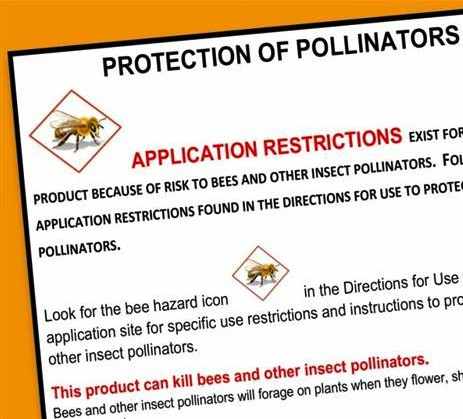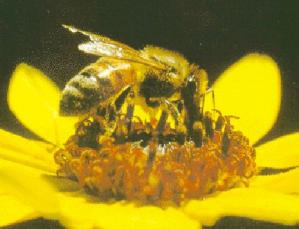 To protect bees and other pollinators, the U.S. Environmental Protection Agency (EPA) has developed new pesticide labels that prohibit use of some neonicotinoid pesticide products where bees are present.
To protect bees and other pollinators, the U.S. Environmental Protection Agency (EPA) has developed new pesticide labels that prohibit use of some neonicotinoid pesticide products where bees are present.
The new labels will have a bee hazard icon and precautions about the spray drift precautions, but environmentalists say they will push the agency to remove these pesticides from the market altogether.
“Multiple factors play a role in bee colony declines, including pesticides,” said Jim Jones, assistant administrator for the Office of Chemical Safety and Pollution Prevention. “The EPA is taking action to protect bees from pesticide exposure and these label changes will further our efforts.”
The announcement last week concerns products containing these neonicotinoids: imidacloprid, dinotefuran, clothianidin and thiamethoxam, which are some of the most widely used insecticides in the world.
As part of its review on neonicotinoids, six new pollinator studies are currently under way by the EPA but they won’t be completed for several years.
Meanwhile, the two agencies continue to work with agricultural equipment manufacturers and the pesticide and seed industries to develop and apply technologies to reduce pesticide drift during planting activities.
In June, tens of thousands of bumblebees turned up dead in an Oregon parking lot after nearby trees were sprayed with one of these pesticides. Since then, the EPA sent new enforcement guidelines to federal, state and tribal enforcement officials to enhance investigations of beekill incidents.
 The Oregon congressman in whose district the bees died, Rep. Earl Blumenauer-(D) introduced the Save American’s Pollinators Act, which would suspend the use of neonics on bee-attractive plants until EPA reviews all of the available data, including field studies.
The Oregon congressman in whose district the bees died, Rep. Earl Blumenauer-(D) introduced the Save American’s Pollinators Act, which would suspend the use of neonics on bee-attractive plants until EPA reviews all of the available data, including field studies.
In April, the European Commission announced a new ban on the use of neonicotinoids that will go into effect later this year. Meanwhile, a federal lawsuit is seeking limits on their use in the United States as well.
Also last week, a report released by the Pesticide Research Institute in Berkeley, California found that 54 percent of garden plants sold at Home Depot, Lowe’s and other top retailers contained traces of bee-toxic pesticides. Residues were identified on seven of 13 samples, which shows a likely source of exposure for bees might be the home garden.
According to the Institute’s Timothy Brown, PhD, these pesticides don’t break down quickly — they remain in the plants and the soil and can continue to affect pollinators “for months to years after the initial treatment”.
“Our investigation is the first to show that so called ‘bee-friendly’ garden plants contain pesticides that can poison bees, with no warning to gardeners,” said Lisa Archer, director of the Food and Technology Program at Friends of the Earth, a nonprofit that partnered on the study. “Bees are essential to our food system and they are dying at alarming rates. Neonic pesticides are a key part of the problem we can start to fix right now in our own backyards.”
The groups point out that a majority of the UK’s largest garden retailers, including Homebase, B&Q and Wickes, have already stopped selling neonicotinoids.
Join their campaign at Friends of the Earth’s BeeAction webpage.



















